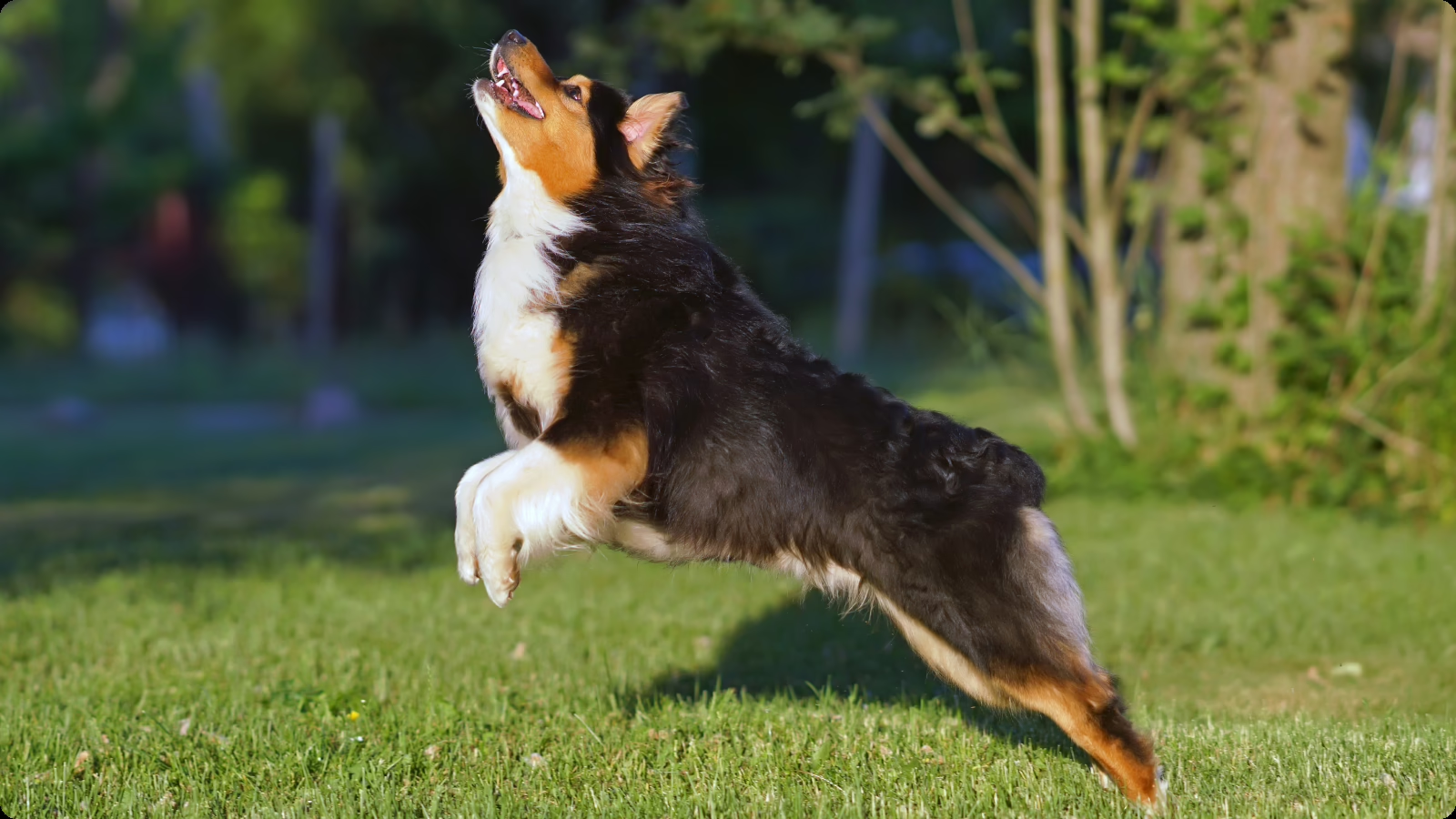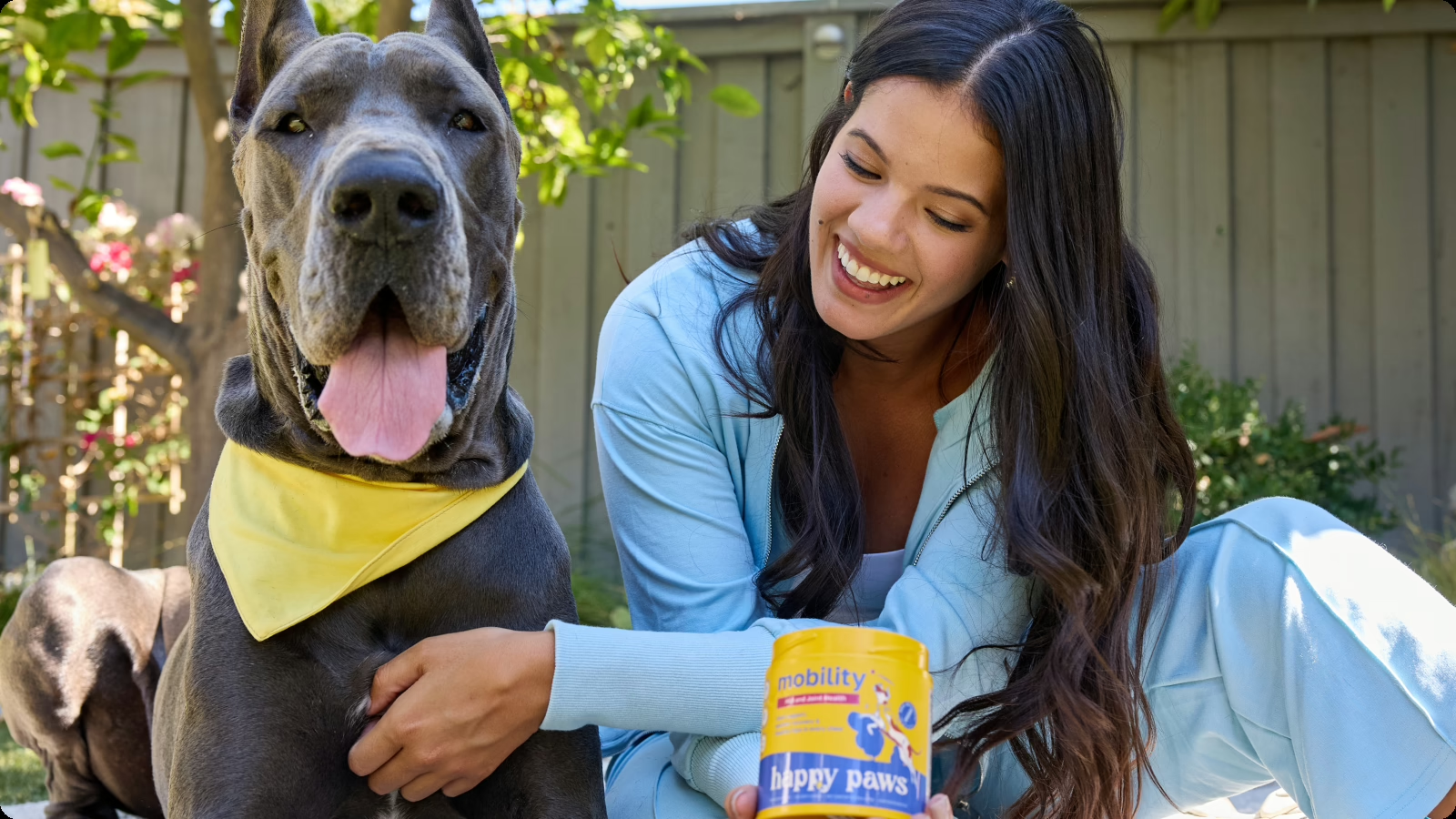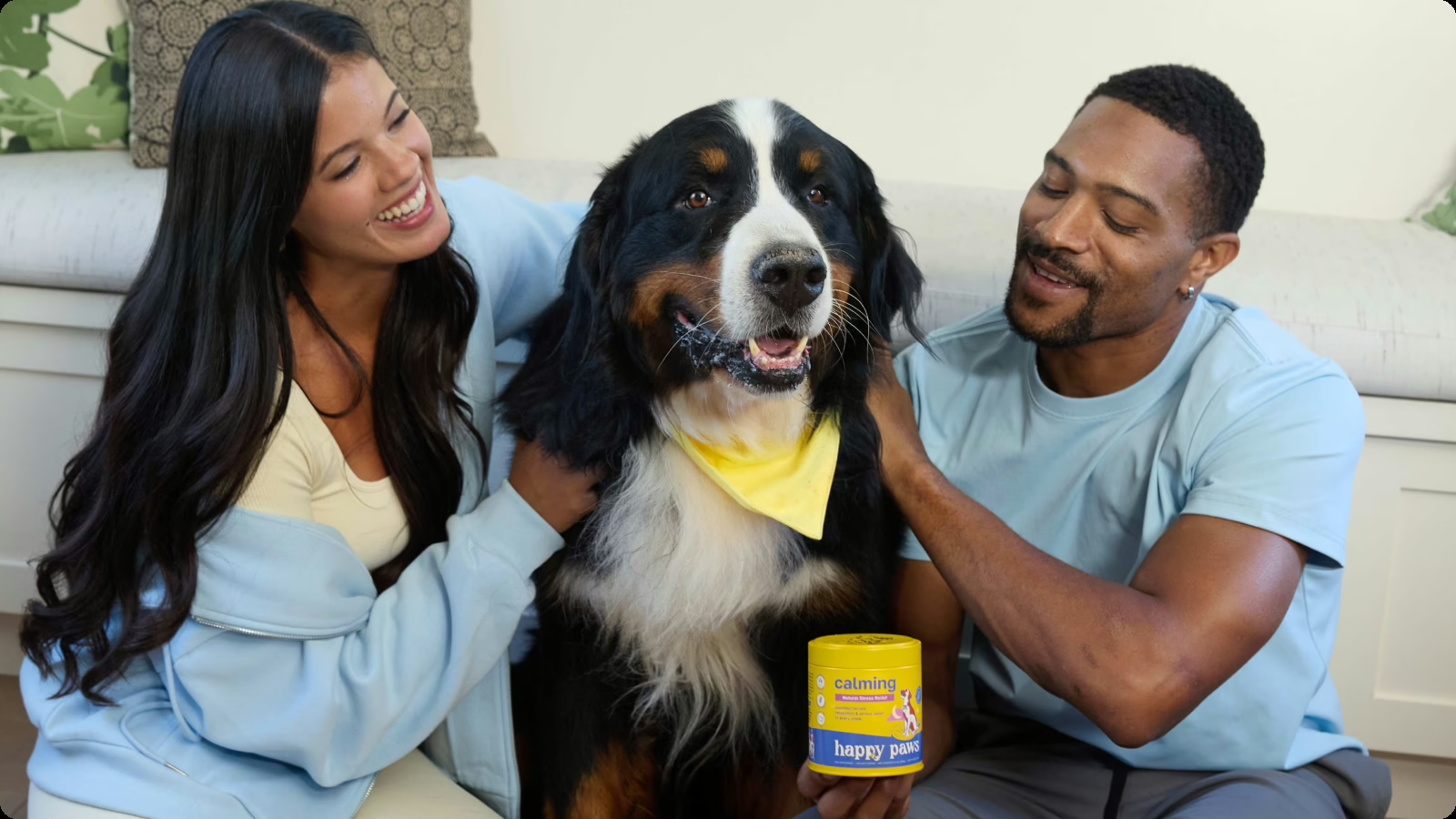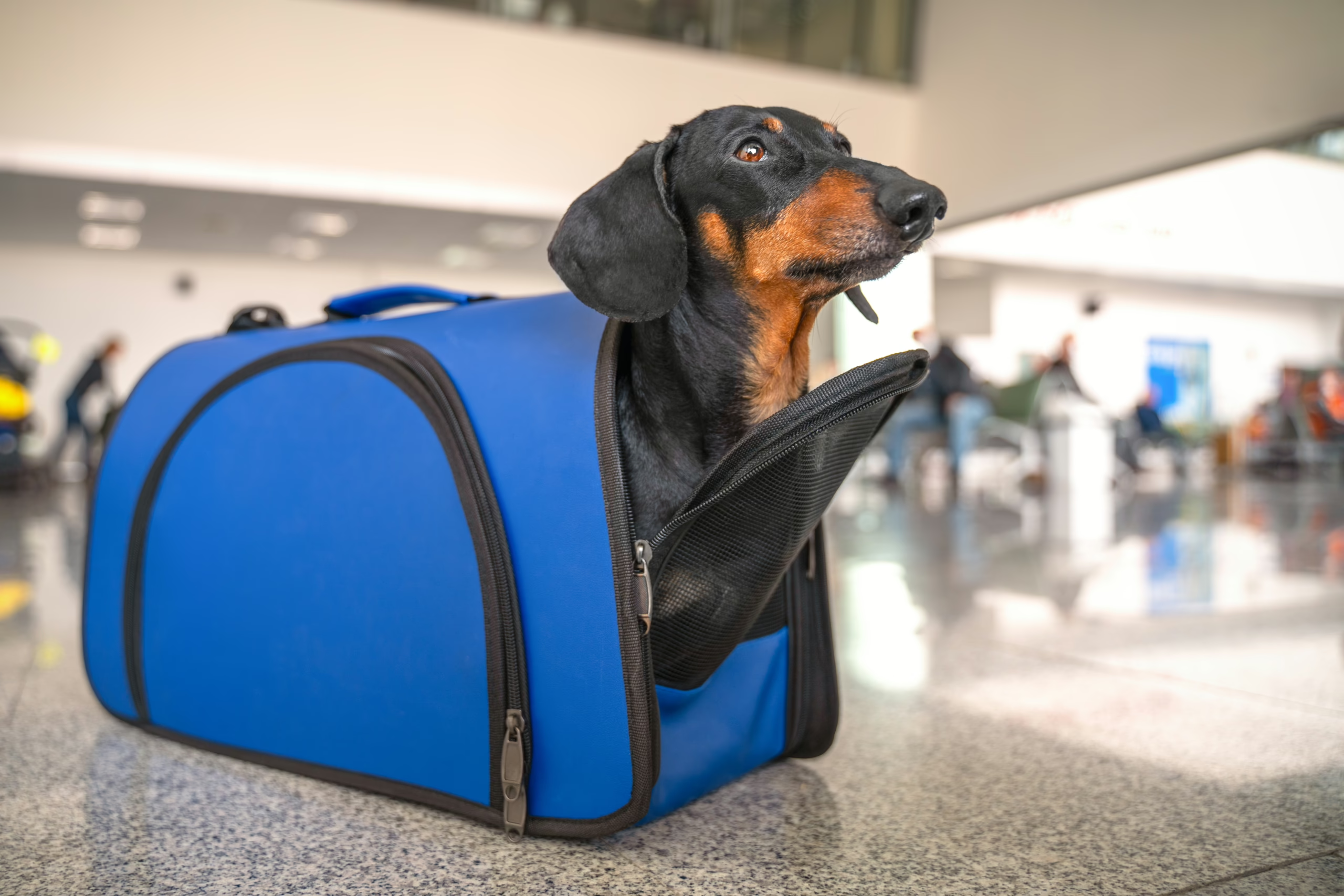Whether from their nook on the couch, their spot at your feet, or their burrow under your bed sheets, your dog is always close by, panting and breathing, often with unpleasant breath. Bad breath in dogs can stem from poor oral hygiene. It may also suggest a number of other underlying health conditions. Your dog’s breath tells us a lot. But what exactly are we sniffin’ for?
Here, we’ll help you soothe the smelly symptoms of doggy breath with the help of daily brushing and dental dog supplements, and then we’ll teach you a little more about the causes of bad breath in dogs. But first, for those who are willfully unaware, let’s explain what doggy breath is exactly.
What Is Doggy Breath?
During puppyhood, many dog owners become a little obsessed with their dog’s breath. Don’t believe us? Ever heard of “puppy breath?” This unique smell only lasts for around four months and slowly fades as your puppy starts teething. Puppy breath is caused by your dog’s clean mouth, missing teeth, and limited exposure to food smells. Puppy breath, in essence, is the purest type of doggy breath.
But, over time, as your dog starts following their nose to strange new foods and eating a heartier diet, their breath changes. As your dog’s teeth come in, food and bacteria can latch onto their teeth and gums, gradually causing a build-up of food particles, plaque, and smells. If your dog eats something smelly (something they’re not supposed to), these particles can stay wedged between your dog’s teeth, causing them to have stinky breath for days to come.
When Does Doggy Breath Start?
Halitosis, commonly called doggy breath, typically starts when your dog begins teething. After all, a primary factor in doggy breath is food build-up around your dog’s teeth and gums. So, while puppies don’t necessarily have stinky breath, they can if they stick their nose into something smelly, or show signs of coprophagia (stool eating), a common problem for puppies and younger dogs.
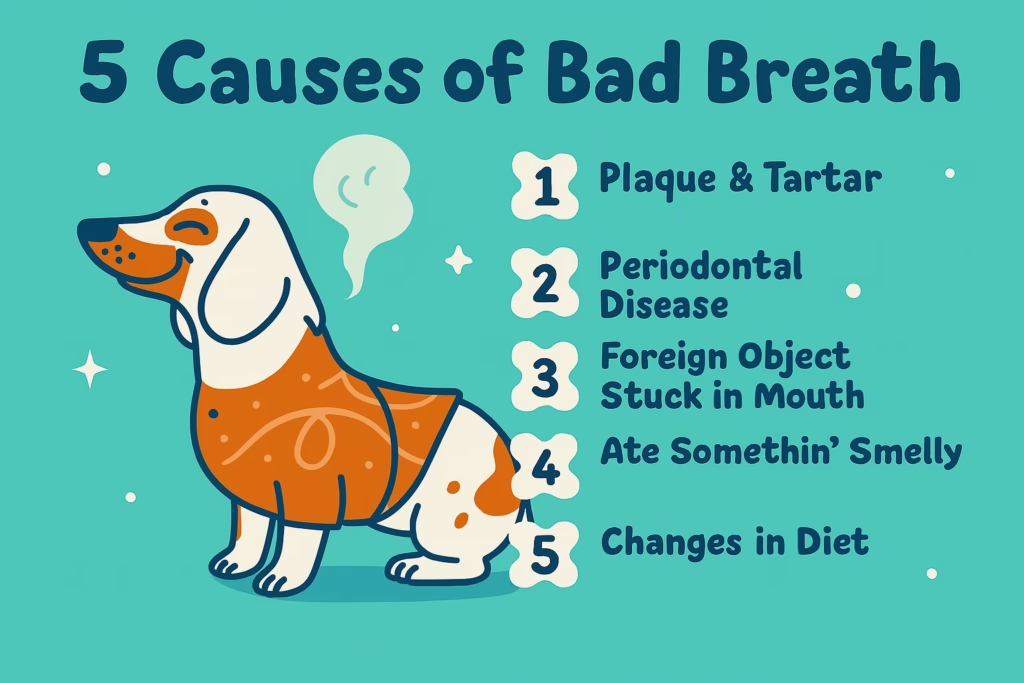
5 Causes of Bad Breath in Dogs
There can be any number of reasons your dog is walking around with rank doggy breath. But here are five of the most common causes.
1. Plaque & Tartar
Just like with us, when your dog chomps and chews, not all of those food particles make their way into their digestive tract. Some particles latch on and get stuck in the crevices around their gums and teeth. If these food particles aren’t scraped away in time, they can harden and develop into plaque. This eventually turns into tartar: a rock-solid substance that takes special attention to scrape away. These two compounds can be the culprits behind consistently smelly bad breath.
2. Periodontal Disease
If tartar isn’t removed from your dog’s teeth and gums, their dental health can take a hit, resulting in a common dental disease called periodontal disease. This disease is caused by plaque and tartar build-up, and first starts off as gingivitis in your dog’s mouth. If the condition worsens, it can seep deeper into your dog’s jaw and may even cause tooth loss. This is why many senior small dogs have issues with their teeth later on in life. However, this dental disease isn’t exclusive to smaller dogs; after age two, up to 90% of dogs show signs of some periodontal disease.
If you believe your dog may be affected by periodontal disease, it is always best to seek professional guidance. A veterinarian will help you find the best corrective treatment and know when to recommend veterinary dentistry.
3. Foreign Object Stuck in Mouth
Another common cause of smelly breath may stem from your dog poking their nose into something they shouldn’t have. Unfortunately, dogs eat many things they shouldn’t; these things can get stuck behind a tooth or wedged between their gums. If your dog’s teeth are regularly cleaned or taken care of, these foreign objects can cause some problems down the road, smelly breath being only one. That’s why it’s important to routinely clean and check out your pup’s teeth and gums.
4. Ate Somethin’ Smelly
Stool eating, also called coprophagia, is a totally normal, yet totally disgusting, canine habit. It can stem from a lack of nutrients in your dog’s diet, a lack of absorption in their microbiome, or a lack of civility—some dogs just like the taste … yuck.
You can help curb your dog’s taste buds with a fibrous, healthy diet and a supplement that aims to deter stool eating, like our No Poo Dog Chews. Made with a wide range of gut-boosting ingredients, these healthy dog supplements do more than just help curtail your dog’s unusual appetite; they also provide a daily boost of antioxidants, fiber, and more!
5. Changes in Diet
Changing or adjusting your dog’s daily diet can throw off the bacteria in their mouth. If you go from a dry kibble to a raw meat-based diet, chances are your dog’s breath will change. For some pet parents, changes in their dog’s diet can improve their pup’s breath. For others, it can worsen it. So, when you want to change your dog’s diet, it’s always best to consult your vet first.
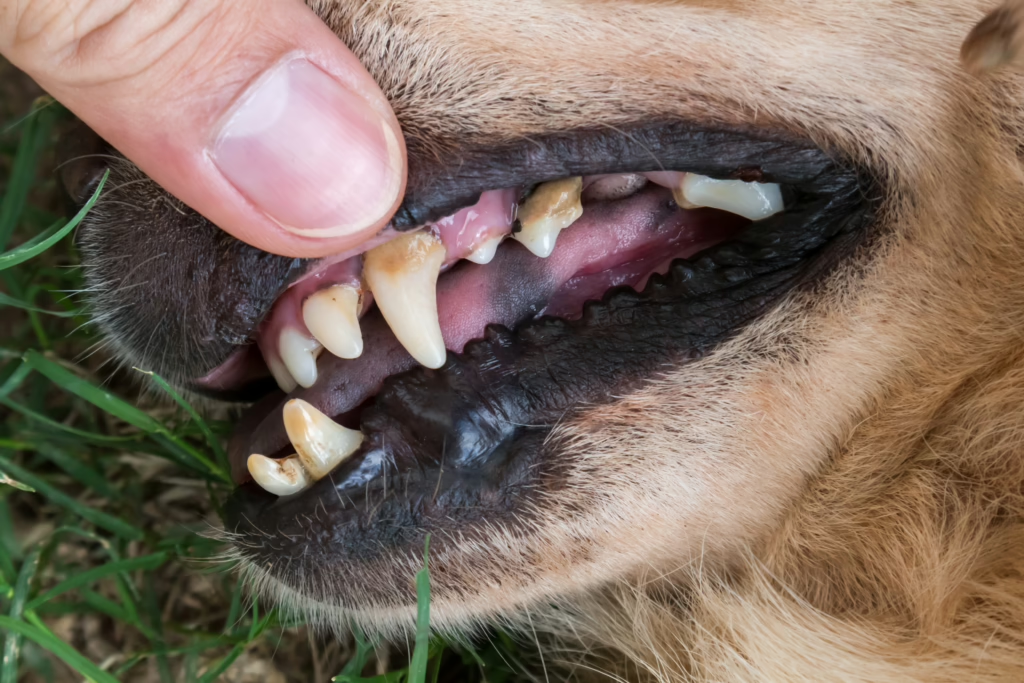
How to Treat Doggy Breath
As you can see, there are so many potential causes of bad breath in doggos. Luckily, there are just a couple of solutions that can help you improve your dog’s dental health—and bad breath.
Regular Brushing
While the science of dog periodontal health is relatively new and ongoing, the research is clear: dogs need their teeth brushed often. Plaque and tartar build-up is detrimental to more than just your dog’s breath; these dental dilemmas can also impact a number of areas in their nose-to-tail wellness. So, brushing your dog’s teeth weekly, if not daily, is always important.
Routine Inspection
We say this all the time, but vets are our best friends; they should be your dog’s, too. We’re happy to have vets on our team, helping us formulate our products and services to best meet the needs of our customers’ dogs. Vets are trained to look for trouble spots that lurk behind basic dental care. They can help diagnose your dog’s troubles and recommend necessary steps forward. When in doubt, always trust a vet to inspect your dog’s dental health.
Dental Treats & Supplements
And finally, another popular option for pet parents is dental supplements, like our Dental Dog Chews. Products like these use an array of all-natural, organic ingredients to neutralize oral bacteria, break up plaque, and promote fresh breath with compounds like fennel and spearmint. When given daily, these chews can help you freshen your dog’s breath and target a number of causes of bad breath.
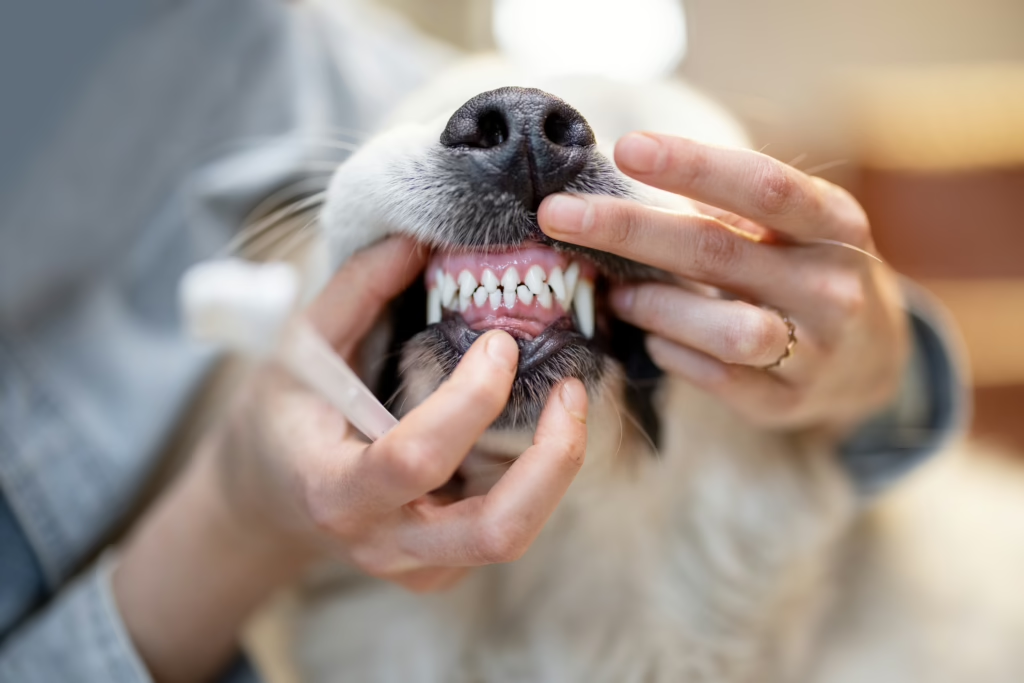
Happy Paws Dental Dog Chews
An easy, proactive way to deal with your dog’s bad breath is with a healthy daily dental chew. Formulated with a natural enzyme blend to neutralize plaque and oral bacteria, our Dental Health Dog Chews use a targeted blend of all-natural ingredients to deliver fresh breath and periodontal support. Plus, these chews contain P-6 Probiotics that help aid digestion and gut health, all wrapped with a natural spearmint flavor.
Parting Thoughts
Doggy breath comes with all the face licks, lap sits, and tail wags; it’s a natural, expected part of owning a pup. But your dog’s breath does hint at larger problems at play—problems that stem from poor periodontal health, nutrient deficiencies, and more. So, if you’re worried about a sudden change in your dog’s breath, it’s always best to consult a vet, who may recommend routine brushing, dental supplements, or a more involved treatment route.

